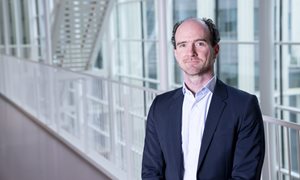
Neurologist Bart van de Warrenburg has been appointed as professor of Rare and Genetic Movement Disorders at Radboudumc / Radboud University. He is mapping genetic causes and disease mechanisms of rare movement disorders. Additionally, he is searching for new forms of disease-modifying and symptomatic treatment, thereby aiming to improve the quality of life for patients.
Rare movement disorders are brain disorders that are usually genetic and manifest through incorrect movements. Neurologist Bart van de Warrenburg specializes in these disorders, particularly ataxia, dystonia, hereditary spastic paraplegia, and rare parkinsonisms.
A proper diagnosis is often challenging. ‘Just for ataxia, there are 150 different genetic types’, Van de Warrenburg explains. ‘We have been searching for years for DNA mutations causing these disorders, and have identified many. But we don't know all the causes yet, so there is still much work to be done.’ All this knowledge about the genetic background also led researchers to better understand the mechanisms causing the diseases.
Natural course
As a result, more and more possibilities for new therapies are emerging. ‘Currently, clinical interventional studies are underway for two types of genetic ataxia’, says Van de Warrenburg. ‘We are testing a therapy using RNA molecules, administered via a lumbar puncture. We are doing this in collaboration with a company and were the first in the world to do so.’ These RNA molecules act as messengers from DNA, our genetic material, and aim to reduce the production of a toxic proteins.
Not all rare movement disorders have such a treatment in development yet. First, the cause and mechanism must be well understood. But there is still an important additional step to be taken, because if researchers want to test a therapy, they need to know how to measure its effects. ‘Therefore, we first study the natural course of a rare disorder, looking, for example, at MRI scans of the brain or biomarkers in the blood. This helps us determine how to best design clinical studies.’
Electrical Stimulation
The development of new drugs is a time-consuming and expensive process. Therefore, Van de Warrenburg also explores so-called drug repurposing, investigating whether existing drugs might also work for some of the rare movement disorders. Since these drugs are already registered, their way towards possible application for other diseases is cheaper and faster.
Another strategy to avoid going through a long process of drug development for every specific condition, is to search for more generic, symptomatic treatment for overlapping symptoms across rare movement disorders. Van de Warrenburg: ‘To quickly offer something to all these patients, we are investigating new forms of rehabilitation, and we are also looking at the effects of non-invasive electrical stimulation of the brain. This looks promising.’
Both clinical care and research are embedded in large international networks, which are crucial for rare movement disorders. For instance, the Radboudumc Expert Center for Rare and Genetic Movement Disorders, led by Van de Warrenburg, is a recognized expert center. This center is connected to the European Reference Network ERN-RND, where he is a board member. Moreover, Radboudumc has an academic alliance with Maastricht UMC+ for this group of diseases. This allows centers to complement each other's expertise and organize care and science together even better.
Career
Bart van de Warrenburg studied Medicine at Radboud University and completed his PhD there in 2005 with a dissertation, entitled: ‘Autosomal dominant cerebellar ataxias, clinical and genetic studies in Dutch patients.’ He underwent neurology training at Radboudumc and then, in 2006, pursued a fellowship in Movement Disorders at Queen Square in London. Since 2007, Van de Warrenburg has been a staff member in Neurology at Radboudumc, focusing on Movement Disorders. Additionally, he was a visiting professor at UKM Medical Center in Kuala Lumpur, Malaysia. His appointment as professor commences on April 1, 2024, for a period of five years.
-
Want to know more about these subjects? Click on the buttons below for more news.
More information
Annemarie Eek

wetenschapsvoorlichter
Related news items

Putting the immune system on its feet
7 July 2025Immune cells gently kick their surroundings using hundreds of tiny feet. If they bump into something hard, it can have major consequences.
go to page


_1.png?width=500&height=300&ext=.png&type=BlockColumn1Zoom1)
